With extensive experience guiding luxury brands through digital transformation, IT Consultis (ITC) has partnered with leading high-end retailers to redefine their digital strategies and meet the evolving demands of the Chinese market.
Navigating China’s complex digital landscape — marked by stringent regulations, unique consumer behaviors, and distinct communication channels — requires tailored, expert-driven approaches.
As a certified Salesforce partner, by delivering localized, compliant, and scalable systems, ITC has become a trusted advisor for global brands seeking to expand and thrive in China.
In this case study, we explore our collaboration with renowned luxury retailers to modernize and localize their Chinese digital ecosystem, driving sustainable growth while preserving their heritage of exclusivity and craftsmanship.
Goals & Objectives
Since entering the Chinese market, these luxury retailers have remained in the early stages of growth, with a limited online and offline presence.
This presented key opportunities to boost brand visibility and strengthen customer relationship management — laying the groundwork to realize their full market potential while maintaining their iconic aura of exclusivity.
Sustaining long-term growth in China requires the establishment of a localized, seamless omnichannel ecosystem. To enable this, we worked together to build a digital foundation aligned with local regulations and rising consumer expectations.
The mission followed three strategic phases:
- Phase 1: Deploying Salesforce on Alibaba Cloud CRM connected to the brands’ localized clienteling application, adapted from the global setup, to align with PIPL requirements.
- Phase 2: Optimizing usage of WeCom and the localized clienteling app among Sales Associates through tailored training, standard operating procedures (SOPs) development, and effective change management.
- Phase 3: Integrating Salesforce CRM, the local clienteling app, and WeCom via a WeCom Mini Program to streamline data flows, enable seamless clienteling, and boost sales and customer loyalty.
Solutions
Building the Foundation for Scalable, Compliant CRM in China
The success of any digital transformation begins with strategic clarity and clear stakeholder alignment. For luxury brands — globally nuanced yet locally exclusive — this is essential.
These projects kicked off with comprehensive onboarding phases, aligning deeply with the brands’ internal teams across both China & the headquarters and their global Salesforce CRM partner.
Detailed benchmarking of clienteling strategies within the Chinese luxury market was conducted, focusing on how top brands leverage CRM, WeCom, communication, and loyalty tools. Subsequently, the internal tools used by these luxury retailers in China were mapped:
- A localized clienteling app: Developed by either the global Salesforce CRM partner or one of the existing global SAAS
- Salesforce on Alibaba Cloud CRM: Selected for its full compatibility and compliance with the digital ecosystem and data residency in China
- WeCom: Used for all-in-one private domain communication between Sales Associates and WeChat clients
This foundation enabled the definition of a localized deployment roadmap for Salesforce on Alibaba Cloud and the clienteling app, ensuring a transparent and agile implementation phase.
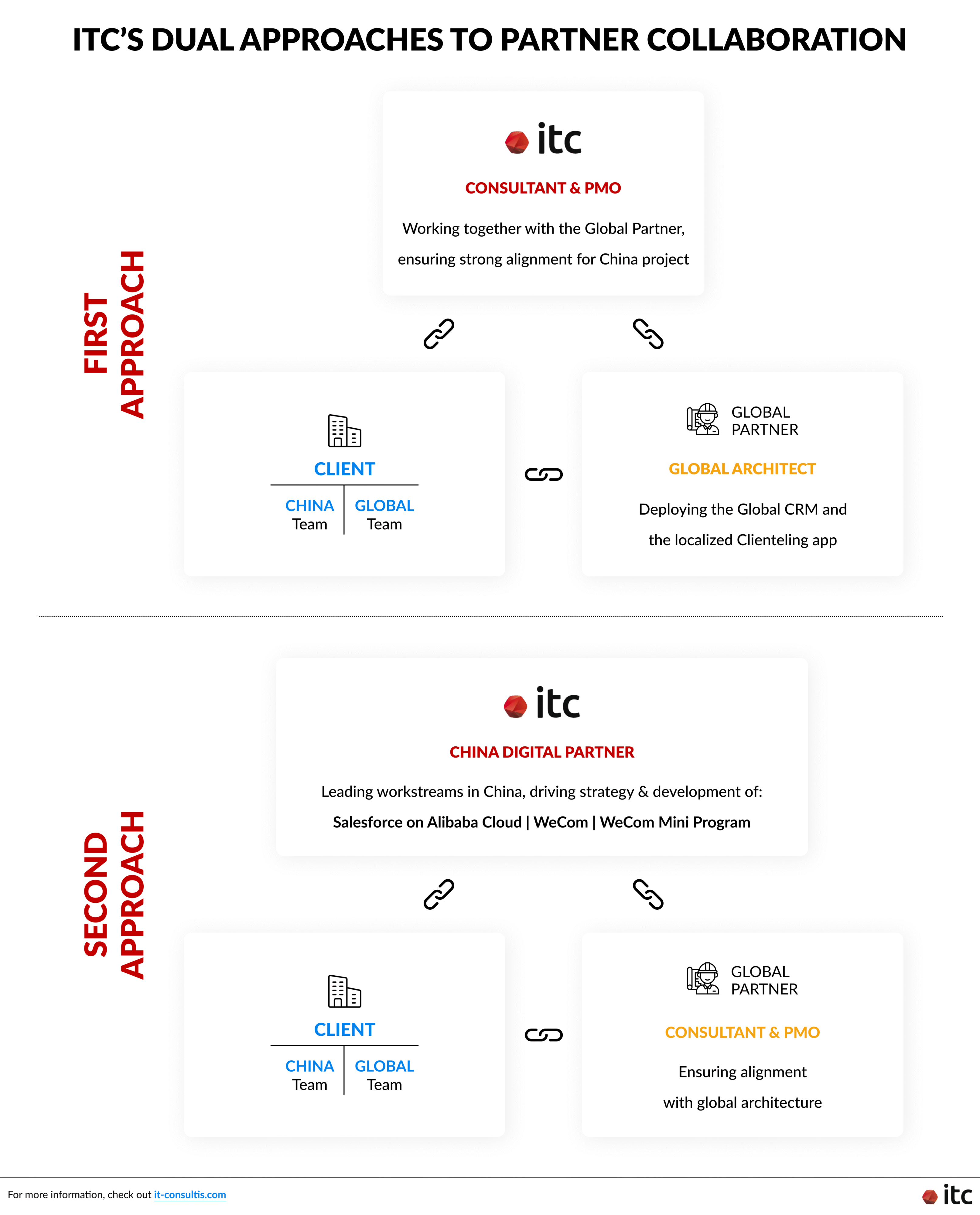
The following analysis adopts the first approach, where ITC collaborates with global Salesforce partners to duplicate the global infrastructure for the Chinese market.
A subsequent article will delve into the second approach, offering comparisons and insights.
Phase 1: Implementing Salesforce on Alibaba Cloud and Integrating with the Localized Clienteling App
Implementing SFOA for Compliance and Scalable Operations
At the core of these brands’ digital transformation in China was the need to deliver a fully compliant, locally optimized CRM ecosystem — one that could elevate online and offline engagement while meeting China’s data protection regulations.
To realize this vision, Salesforce on Alibaba Cloud was deployed from the ground up, ensuring full compliance with China’s Personal Information Protection Law (PIPL) and alignment with the brand’s global architecture.
Key responsibilities included:
- SFOA production environment full configuration, including metadata, user roles, permissions, and data models.
- Architecture localization, ensuring optimal performance, robust security, and full compliance with standards.
- User management connector development (usually Active Directory (AD), but can also include Okta or IAM), synchronizing employee data from the brand database with SFOA, and ensuring secure and enterprise-grade access control.
- Core business elements data migration, covering Accounts, Orders, and Order Items, ensuring seamless transfer of existing Chinese accounts from the global CRM system (if applicable) while adhering to strict protocols and collaborating with compliance and legal teams.
- System testing and performance optimization, engaging with the brand’s China business team.
- Stakeholder coordination, collaborating closely with the global Salesforce CRM partner and local SFOA teams, ensuring architectural consistency.
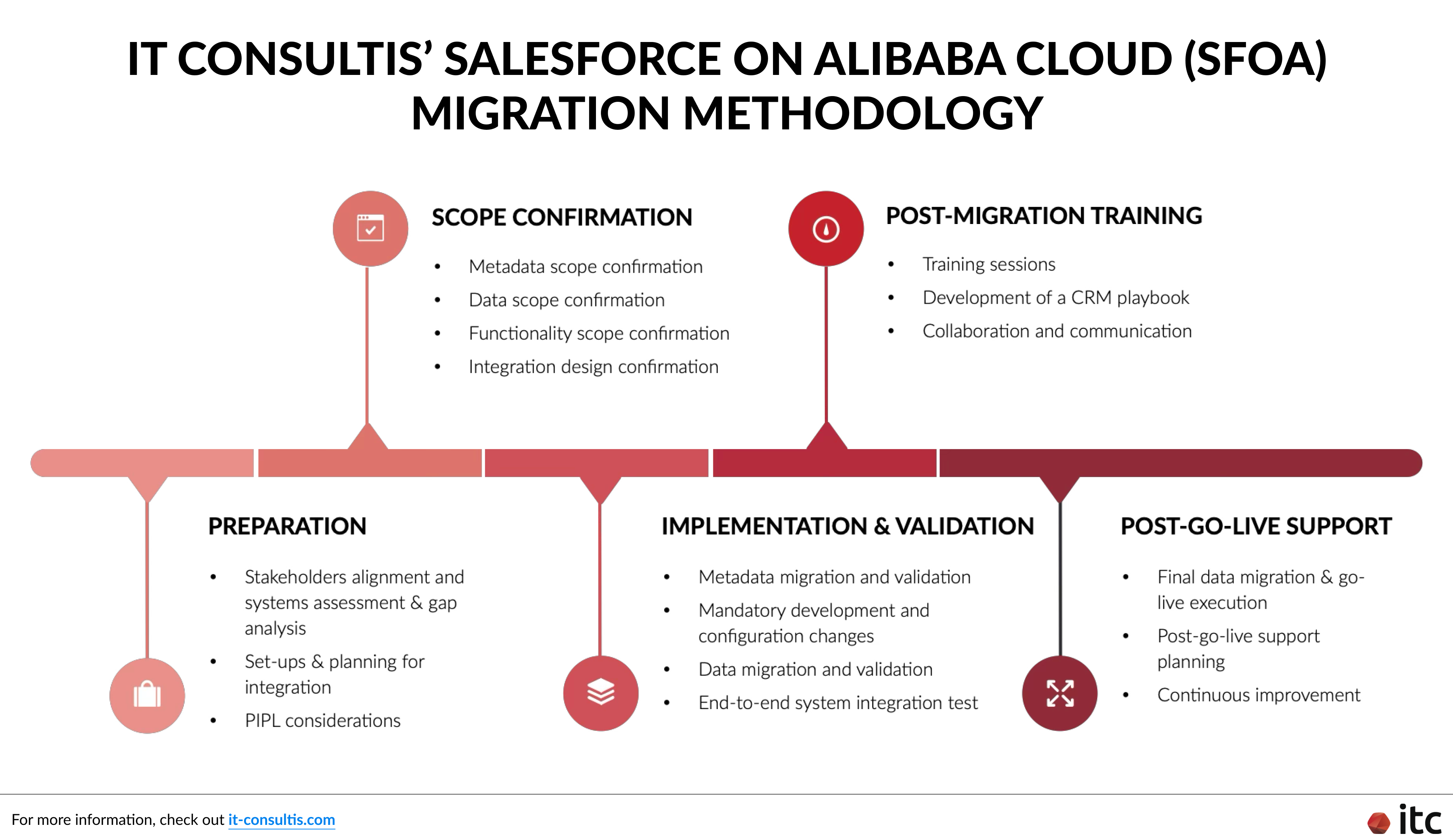
Connecting the Localized Clienteling App
In parallel, the retailers’ global CRM partner worked with ITC to localize the global clienteling app for the Chinese market — a robust front-line tool aimed at empowering in-store Sales Associates across their boutiques in China. This process can also involve leading global clienteling apps, such as Tulip.
The application enabled staff to build and manage personalized client relationships through features such as customer profile access, purchase history tracking, segmentation, appointment scheduling, and task management.
While the global Salesforce CRM partner handled the Salesforce-to-clienteling-app integration, we worked closely together to ensure technical coherence, resolve integration issues, and align system logic with local expectations.
The result: a secure, scalable, and fully compliant CRM foundation enabling the brand’s China teams to deliver consistent, high-touch client engagement while staying aligned with the retailers’ global standards.
Phase 2: Driving WeCom & Localized Clienteling App Adoption Among the Sales Teams
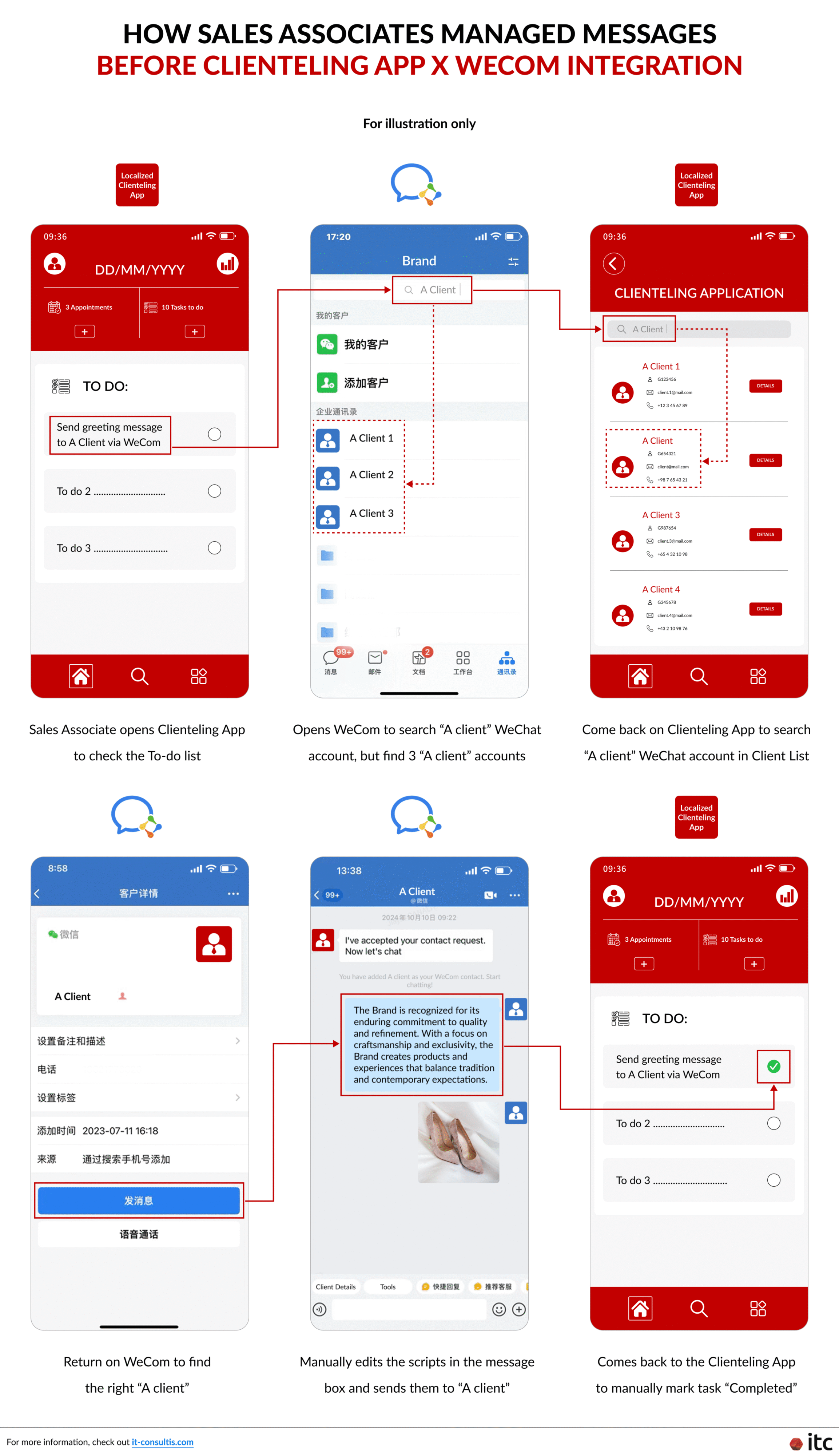
To empower data-driven, high-touch clienteling in China, WeCom was enabled as the central communication platform for Sales Associates, seamlessly connected with the localized clienteling app.
A joint strategy for WeCom and the localized clienteling app integration was defined via:
- Conducting hands-on training sessions for key teams on WeCom’s different functionalities and clienteling strategies
- Evaluating current Sales Associates’ operational workflows and clienteling procedures across store tiers
- Designing a role-specific enablement plan for Sales Associates, Store Managers, and Regional Leads
- Defining KPIs and performance metrics to track WeCom clienteling effectiveness
- Introducing SOPs, a structured client tagging strategy, and data ownership policies
These efforts ensured that the brands’ frontline teams can fully leverage both clienteling platforms — maximizing data capture, improving segmentation, and enabling more personalized engagement throughout the customer lifecycle.
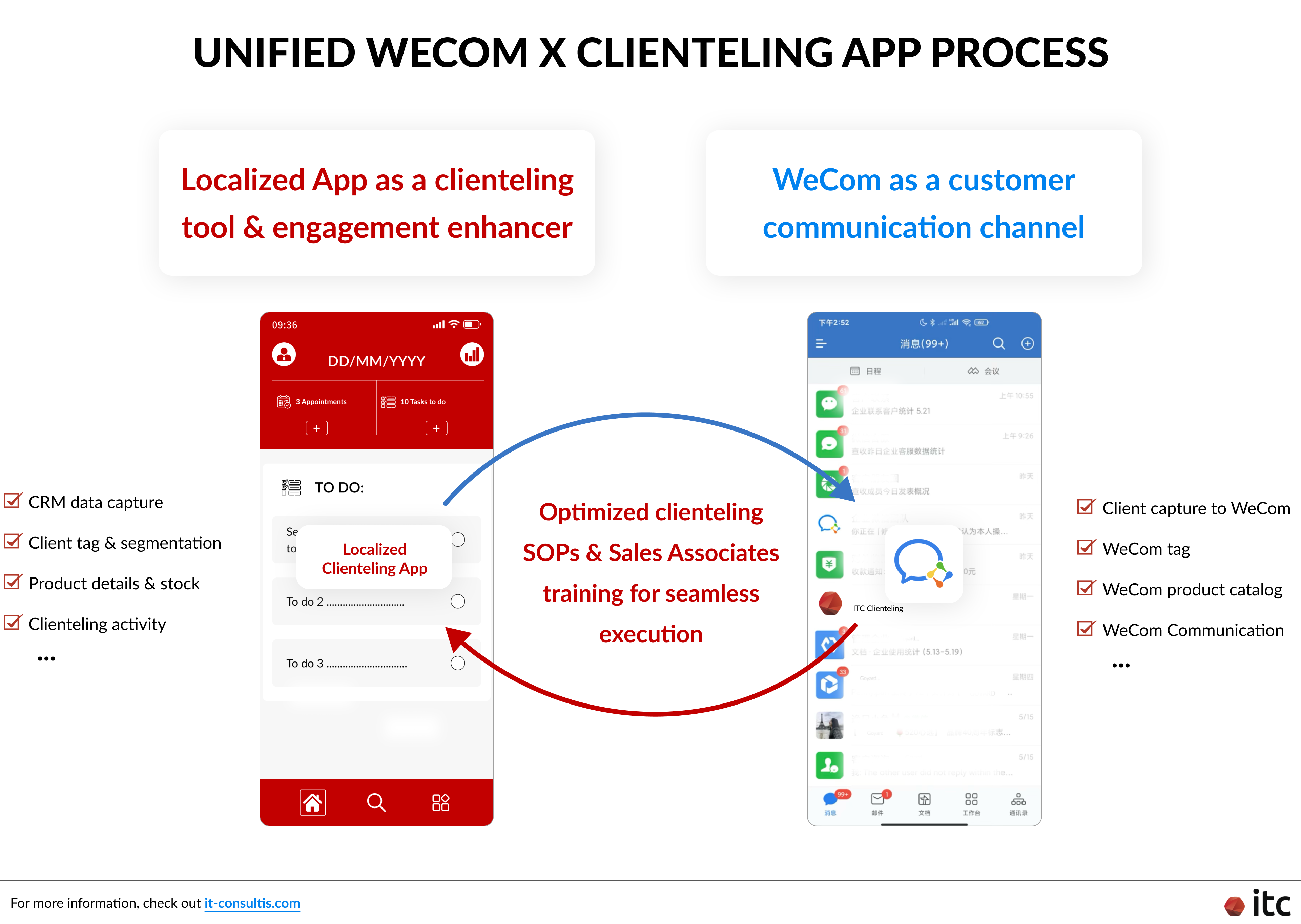
Phase 3: Streamlining the Data Flows and Clienteling Experience Through Salesforce x WeCom x Localized Clienteling App Integration
With SFOA deployed, the clienteling app localized, and WeCom adopted, the final phase focused on enabling a fully integrated ecosystem through the development of a WeCom Mini Program. Once launched, this Mini Program enabled Sales Associates to:
- Access CRM insights and customer data directly within WeCom
- Connect with Chinese customers seamlessly by leveraging WeCom and the localized clienteling app
By embedding the clienteling experience into China’s dominant business communication platform, the retailers could redefine their luxury service in a mobile-first market — maintaining their legacy of discretion and craftsmanship while adapting to local consumer behavior.
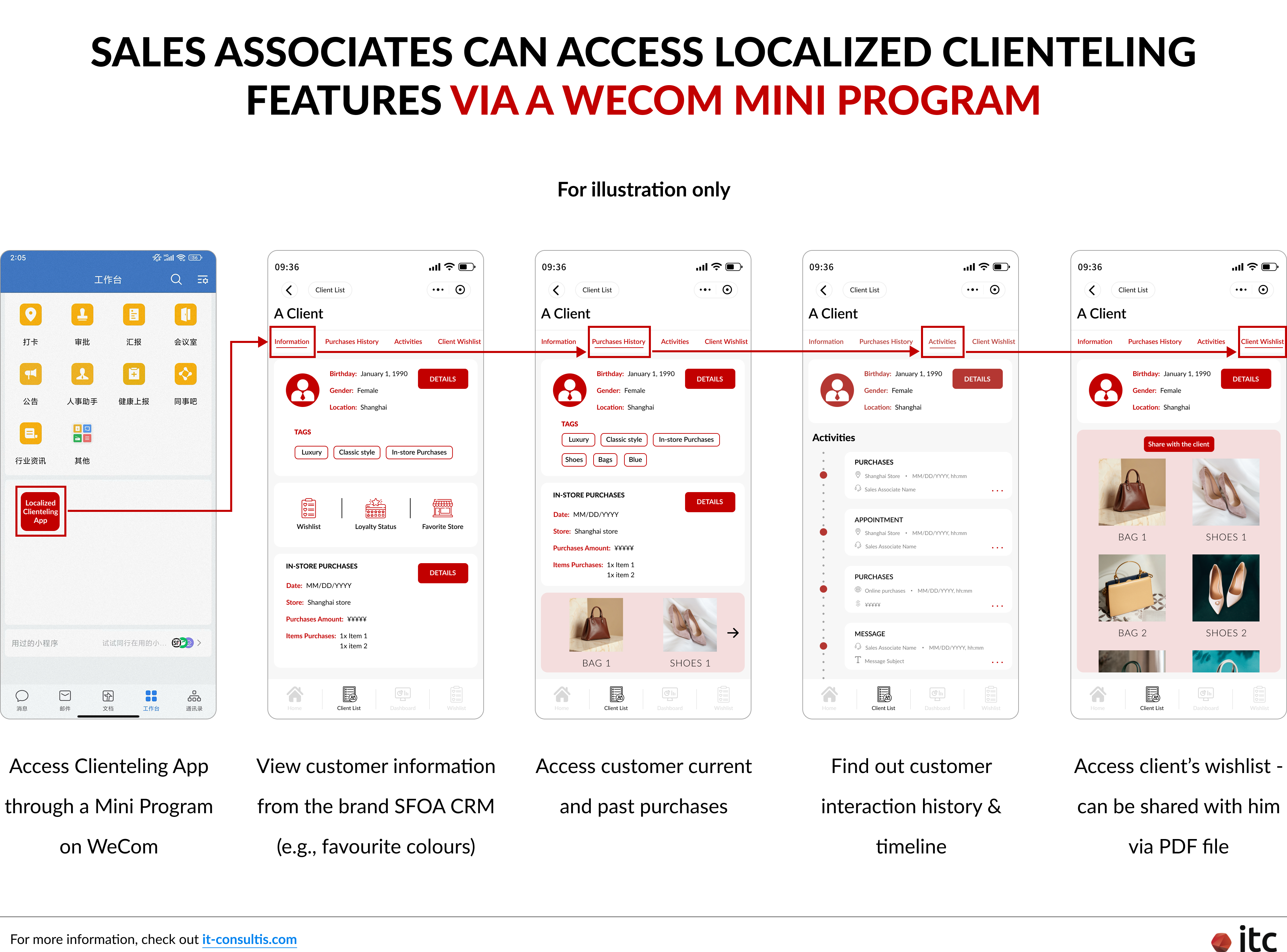
Results
The successful deployment of Salesforce on Alibaba Cloud provided these luxury brands with a compliant, localized CRM infrastructure tailored to the Chinese market and fully aligned with their global standards.
The platform enables secure data management, streamlines retail operations, and lays the groundwork for omnichannel engagement in China.
With the localized clienteling app now live, connected to SFOA, and integrated with the WeCom Mini Program, Sales Associates are now equipped to deliver richer, more personalized customer experiences — enabling these luxury retailers to scale their high-touch service and deepen customer loyalty in China’s competitive market.










